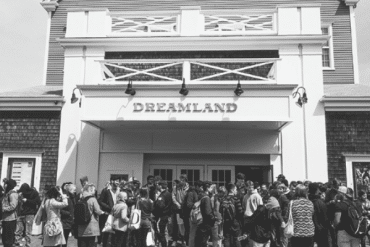According to recent polls, Charlie Baker has emerged as the most popular governor in the country, winning praise from both sides of the aisle. Cast in the mold of former governors William Weld and Francis Sargent, Baker is seen as a true “Massachusetts Republican.” Before his visit to Nantucket this July, Governor Baker spoke to N Magazine about his policies, his history of bipartisanship and his thoughts on the presidency.
N MAGAZINE: What were your impressions of the island when you first visited Nantucket?
GOV. BAKER: The main impression I came away with was the beauty of the shoreline and the incredible job people have done preserving a lot of green space all over the island. My wife and I took our kids there when they were little. We spent the week doing the stuff that families do: we went to the beach, out to dinner, to the movies. We just really enjoyed the island.
 N MAGAZINE: Despite how idyllic Nantucket appears, the island suffers from a lot of the same problems as the rest of Massachusetts. One of the direst problems is a shortage of middle-market housing. What would you recommend to address the island’s housing crisis?
N MAGAZINE: Despite how idyllic Nantucket appears, the island suffers from a lot of the same problems as the rest of Massachusetts. One of the direst problems is a shortage of middle-market housing. What would you recommend to address the island’s housing crisis?
GOV. BAKER: One of the things that drives the price of housing is supply. If a big part of the island is undevelopable, then almost by definition you’re going to start with constraints around supply. We struggle with the same issue in big chunks of Eastern Massachusetts. One of the things we’re in the process of doing here in Greater Boston is working with local communities to see if we can take state-owned property and make that available for development purposes at deeply discounted rates. There are three big things that drive the price of housing: land, time and construction costs. Our goal is to make state property available to then be used for development purposes and to get a commitment from locals that they’ll do something to speed up the permitting processes. I haven’t done the homework or the research, but to the extent that there is publicly available or publicly-owned property — whether it’s ours or Nantucket’s — we’d be perfectly happy to talk to people about putting that to work.
N MAGAZINE: You’ve been deeply involved in addressing the opiate epidemic. It’s a significant problem on Nantucket as well. What’s the primary thrust of your efforts?
GOV. BAKER: This is an issue everywhere. I would say to folks on Nantucket that you are not alone if you are dealing with this. We brought a task force in shortly after we took office and put together four big categories of recommendations: prevention and education, intervention, treatment and recovery. Administratively and legislatively, we’ve been seeing solutions in all of those categories since I took office.
On the prevention education piece, the healthcare community has been way too casual about this stuff. We’ve been very aggressive about both medical schools and the dental schools in Massachusetts. Going forward they are going to make training around the use of pain medication and addiction the core competency to graduate from medical school and dental school. That was never true before. We’re going to mandate that people who are prescribers have to take in-service and continuing education in this area, which has never happened before. And we got a law passed earlier this year that limits first time prescriptions to seven days. There’s just been way too many thirty, sixty, ninety-day prescriptions written for stuff where it just doesn’t even come close to making the case for it. On each of these initiatives the goal here is to do what we can to prevent [addiction] from happening in the first place.
 N MAGAZINE: Switching to politics, your popularity in the state on both sides of the aisle is exceedingly high. What messages would you send to Washington to help narrow the divide between the factions that appear in this country?
N MAGAZINE: Switching to politics, your popularity in the state on both sides of the aisle is exceedingly high. What messages would you send to Washington to help narrow the divide between the factions that appear in this country?
GOV. BAKER: As an administration we said we were going to be bipartisan, and if you look at our cabinet, our cabinet is about half Democrats, half Republicans and some independents. I believe they’re the right people for the job in terms of their skills and their experience. We didn’t spend a lot of time worrying about the letter at the end of their name.
The second thing is you have to be willing to work on your relationships. It’s no different here than it is in friendships or marriage. [Lieutenant Governor] Karyn Polito and I work on our relationships with our colleagues in the legislature and our colleagues in local government a lot. We don’t spend a lot of time worrying about party affiliation when we’re trying to solve problems and come up with good ideas. Campaigns are about contests, but governing is about the work.
N MAGAZINE: Why doesn’t Washington adopt this thinking?
GOV. BAKER: One of the big problems Washington has is they are in permanent campaign mode. It’s all about the six o’clock news and who wins the next day’s headlines. They really think about this as winning and losing every day. If you think about it that way, it’s going to completely screw up your ability to play the long game and think about what you’re really trying to accomplish.
N MAGAZINE: Were you predisposed to bipartisanship?
GOV. BAKER: My mom is a Democrat; my dad is a Republican. They’ve been unbelievably happily married for over sixty years. I grew up listening to them argue about politics across the dinner table. One of the big things I learned is you can disagree without being disagreeable. Secondly, nobody’s got the corner on all the answers. The final thing I would say is that you have to be soft on the people and tough on the issues.
 N MAGAZINE: Massachusetts is at the forefront of the robotic revolution. A lot of people are concerned about the social consequences of an entire working class of people who could actually be displaced by robots. Have you given any thought this?
N MAGAZINE: Massachusetts is at the forefront of the robotic revolution. A lot of people are concerned about the social consequences of an entire working class of people who could actually be displaced by robots. Have you given any thought this?
GOV. BAKER: Not so much specifically robotics, but I have thought a lot about the whole issue of job displacement. That’s one of the reasons why we have been hugely focused on skill-building. I think we’re the first administration that’s ever proposed to make a major investment in the Commonwealth’s career technical schools. We actually just announced last week a collaborative commitment with the state’s community colleges, state universities and UMass that will reduce the cost of attending. I am very focused on creating opportunities for the next generation of young people. This isn’t just about the next generation of scientists and doctors; this is about creating opportunities for people to get the skills that they need to be successful in an increasingly technologically sophisticated economy.
N MAGAZINE: You’ve made your position known on the presidential field relative to your discomfort for both candidates. No matter who wins at this point, it doesn’t seem like Massachusetts, or at least the governor’s office is going to be terribly well-positioned. Any thoughts on the impact of who ends up in the White House relative to you?
GOV. BAKER: Who’s in the White House matters a lot to me, but what ultimately matters most is who ends up in some of those key cabinet positions.Those are the people you typically end up dealing with most on the state level. If you were to ask me how much face time or phone time I’ve had with President Obama or Vice President Biden, the answer would be “not much.” But if you were to ask me how much time I’ve spent with various members of their cabinet working on transportation, human services and community development, the answer would be “quite a bit.”
N MAGAZINE: Massachusetts has a long history of governors getting Potomac fever very early in their terms. Are you at least curious as to what life is like politically beyond being governor of Massachusetts?
GOV. BAKER: No, I’m very much a Massachusetts person. I’m very focused on what goes on here. I don’t have interest in, or aspirations for, higher office. This is the job, and I think I would be a better governor if I just focus on what matters here. The minute you start looking over your shoulder about how a decision might affect your success nationally, you start not making the best decision for the Commonwealth. I’m never going to go there.





